In this, the final issue of The Peoria Woman, we take a fond look back at nearly two decades of feature interviews. We would like to recognize the many women (more than 220!) who have been interviewed for our cover stories over the years, plus the many, many more featured in our articles and profiles. Your leadership has been truly inspiring! Each of your stories has helped lay the groundwork for our present-day Peoria community, as well as where we hope to go in the future. Thank you for sharing with us!
A big thank you also goes to all who contributed articles, stories, columns, photos or other information to the magazine. We couldn’t have done it without you!
I have reviewed every issue published since 1990, and yes, I remember each interview. In the beginning, we conducted our interviews in person, but after several years, with the increased pressure of deadlines, we began to use a new technology called email for our interviews!
A handful of women appeared on the cover more than once; many others have left the area or retired from the positions they held at the time of their interviews. We have interviewed two of Illinois’ first ladies, as well as judges, attorneys, physicians, educators, executives and heads of non-profit organizations. Two of our former cover stars—Colleen Callahan and Joan Krupa—are currently running for elected office.
I offer my sincere apologies to Anne Fox and Lesley Matuszak for not catching the misspelling of their names on the cover. Over the years, we have tried our best to be accurate with our reporting, and we humbly ask for forgiveness when mistakes were made.
What follows are brief excerpts from some of our cover interviews—many of which can be found online at peoriamagazines.com. These women were selected because they are still living and working in central Illinois, although they may not be in the same positions or with the same companies—or even use the same name—as when they were interviewed.
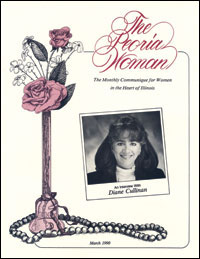 MARCH 1990—Diane Cullinan Oberhelman, Cullinan Properties
MARCH 1990—Diane Cullinan Oberhelman, Cullinan Properties
“I think that I am in a unique position because I have been on the other end. I’ve been a receptionist. I’ve been a secretary…Many businesses right now are trying to rotate positions so that everyone can get a feel for the other person’s role, and I think that I have been lucky to have been at one time in my life in most of these positions. So I am a little more sensitive to others’ input.”
APRIL 1990—Colleen Callahan, WMBD Radio
“People will tell me now, ‘We didn’t want to like you.’ But I knew agriculture. I spoke their language. As they realized that I knew what I was talking about, gradually I became accepted and respected as well. You can be one of the guys, sometimes going along to get along, and maintain your femininity at the same time. It wasn’t because I was a ‘women’s libber’ that I wanted to do this stuff. It was my sincere interest.”
JUNE 1990—Rebekah Bourland, Peoria Area Chamber of Commerce
“More and more women are going to want more than just family, although having a family is very rewarding, and I think that women are always going to want that. But they are also going to want to maintain some kind of professional life outside of family.”
JUNE 1991—Christine Zak-Edmonds, WEEK TV-25
“For a long time, I had to fight to be equal. Some of the young women who are behind me now, and have certain privileges, really have no idea that I parted the waters for them. I don’t want any thanks for that; it’s just that if they complain about this, that and the other, I want to say, ‘You have no idea how good you’ve got it!’ When I first came here [News 25], I wasn’t allowed to start a newscast.”
NOVEMBER 1991—Barbara Mantz Drake, Peoria Journal Star
“In some of the earlier years I think there was always the presumption that girls did not take careers as seriously as men. I may have made that presumption myself sometimes. Things have changed tremendously. I don’t detect any gender bias here now. Women have as much opportunity to aspire to high positions as men do. The problems are two-fold in doing that: first of all, there aren’t as many women who have a long work track record, and secondly, as long as household chores and taking care of children remain primarily women’s work, it’s much more difficult for women to put in the hours and devotion to very demanding jobs.”
JANUARY 1992—Carla Reed Wingfield, Illinois Mutual
“I don’t think that being a woman in business is easy…I have said before that one of my pet peeves is adult women being referred to as ‘girls.’ It’s a feeling, not just a terminology, that indicates that you are not on the same level as men. I’m not a ‘women’s libber’ but I think it’s something that all women run into as they try to succeed in business.”
JUNE 1992—Joan Krupa, Peoria County Board
“I was first elected to the Peoria County Board in 1988. I had been attending county board meetings for about a year and I felt like I had a contribution to make. Naiveté was probably the best reason to run, because I didn’t know what or who I was running against…I just ran because I thought I should be on the board!…The Peoria County Board was the first office for which I ran. I basically ran for public office at that point because I had just finished serving on this national board where I had seen that you have to get involved in order to affect changes—just sitting back and complaining won’t get the job done.”
JULY 1993—Bonnie Noble, Peoria Park District
“If, as a woman, you are going to play in this arena [public office], you have to realize you must produce 150 percent to be recognized. You have to give of yourself to do these jobs. I think that the sexual harassment suits coming out are going to make it even harder for women to compete. What it’s going to do is make men shy away from networking with women, and some of the doors that would have been opened are going to be closed.”
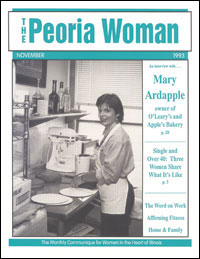 NOVEMBER 1993—Mary Ardapple, Apple’s Bakery
NOVEMBER 1993—Mary Ardapple, Apple’s Bakery
“There are few opportunities that have been out of my grasp as a woman. Being a woman has never held me back. As an owner, if you’re married, make sure your relationship is very secure because of the sacrifices you have to make.”
NOVEMBER 1994—Carol Trumpe, Peoria County Board
“Certainly, the women’s movement has opened up many more opportunities for women in society. I think we have entered a phase now where more gains will be made through mutual respect and cooperative participation than through confrontation.”
DECEMBER 1994—Patty Shaheen Fuchs, Goodwill Industries of Central Illinois
“When I went to college in the ‘60s, all the women were either studying nursing or education! If I had gone to college today, I honestly think I would have gone into engineering or architecture…I didn’t want to be a nurse, so I became a teacher, teaching for five years after college graduation up until two weeks before my first daughter was born. I consider myself very lucky to have been a stay-at-home mom while my daughters were young.”
JUNE 1995—Kathryn Timmes, Peoria Public School District 150
“During those years of teaching elementary education [mid-50s], District 150 had hired one or two minorities in the high school…I was angry because of the lack of hiring of minorities in most of the institutions and industries. I was teaching the children they could do anything with an education, but they weren’t being hired. There were places in town where we could not eat! I remember being denied access to a Peoria restaurant in the early ‘60s. I wanted the children to be able to understand that things were going to change and they needed to be prepared for that change.”
AUGUST 1995—Diana Hall, Bard Optical
“I have often thought, I didn’t just set out to get from point A to point B; I was driven by responsibility. I had two small children to support and just kept pushing to be successful. I am frustrated when people, women in particular, aren’t appreciated for what they do…It’s interesting—once you get to a certain level, many people have no idea what it took to get to that level.”
APRIL 1996—Dr. Sara Rusch, University of Illinois College of Medicine at Peoria
“People like myself with visible professional careers may make the cover of a magazine, but we actually have advantages that many other working women don’t. Our careers are in areas financially rewarding enough to hire household help. It means we don’t have to do laundry and housecleaning. I have a lot of admiration for women who work all day at a job outside the home that isn’t as emotionally or financially rewarding, then come home and deal with their children as well as clean and cook for the family…We underestimate what some women have to go through in terms of balancing work and family.”
JUNE 1996—Sue Ann Kortkamp, Children’s Hospital of Illinois
“In 1983, I decided to run for public office. It was my first experience running for office, and it was the first time a woman’s name had appeared on the ballot for city commissioner in Pekin…I felt the impact of the “old boys network” after I was elected, however. People would address the city council as the city ‘fathers.’ I would chuckle and think, ‘Don’t they see me?’”
MARCH 1997—Sue Wozniak, OSF Saint Francis Medical Center
“Men and women both have the same family responsibilities. I’m excited to see men go home early for their kids’ school programs. That’s something I had to learn how to do; I thought that if you took time to do something with your family, you were less valuable to the organization, or not carrying your full weight. And I think we women tend to overdo that, when really it’s not necessary.”
JULY 1997—Roberta Parks, Peoria Area Chamber of Commerce
“It never occurs to girls my daughters’ age that their career options are limited to a teacher or nurse. It never occurred to them that someone might not hire them because they are a woman. They do not feel that same level of need as the generation before them. I have a concern that there might be a backlash somewhere along the way because of that. When women my age are no longer actively involved in business and those young women who have never seen unfortunate instances when women were held back, weren’t considered for positions or couldn’t consider running for public office—if they don’t see that, they won’t be prepared for the backlash that may come.”
FEBRUARY 1998—Pam Schubach, YWCA
“Equity is a word we are still coming to grips with in terms of male and female relationships, let alone all the other situations that occur. It is always difficult to create equal chairs at the policy-making tables. We have too many hidden agendas, and there are those who think they have all the answers if they just had all the money. Creating the table takes a lot of work, but the end results are always worth the effort.”
JULY 1998—Nancy Affolter, Behavioral Health Advantages
“Get to know yourself. It’s very easy in today’s fast-paced business and professional environment to forget, or not take the time to know, what’s right for you. It’s also very easy to be persuaded that the model for success is what you see exhibited by male leadership—but it may not be right for you. Take the time to actively pursue feedback on your strengths and weaknesses, develop a course that’s right for you, and have fun along the way.”
AUGUST 1999—Dr. Sarah Nath Zallek, Methodist Medical Group
“A woman entering medicine today still enters a field of mostly men, but there is now opportunity for women to succeed in medicine as they choose. Women are represented in every field, and one can make her own choice about focus on research, teaching and patient care.”
OCTOBER 1999—Mary Ann Penn, Peoria County Regional Office of Education
“I feel very frustrated when I hear ‘Kids, today, are different.’ Usually it is spoken in a disapproving tone. I have the urge to ask, ‘What isn’t different today? Why shouldn’t they be different?’ As the world changes, the experience of childhood changes. That doesn’t necessarily mean that the core of who they are is so different from who we were. They might be dealing with different issues, but have the same basic needs—affirmation, recognition, opportunities to succeed, permission to fail. I believe it’s more about support and less about judgment.”
JUNE 2000—Bonnie Bakin, Better Business Bureau of Central Illinois
“Ten years ago, gender issues may have been an occasional stumbling block. Even now, we occasionally get calls concerning salespeople who refuse to provide an ‘in-home’ estimate unless ‘the man of the house is available,’ but this sales tactic seems to be declining. Our calls depend less on gender and more on individual household responsibilities, and company responses are more in tune with customer satisfaction and business reputation than gender.”
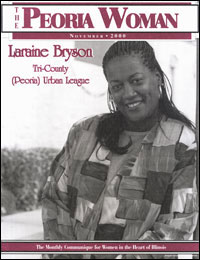 NOVEMBER 2000—Laraine Bryson, Tri-County Urban League
NOVEMBER 2000—Laraine Bryson, Tri-County Urban League
“Yes, much progress has been made in the last 40 or so years; however, much work still needs to be done. As long as any person is discriminated against because of the color of their skin, not enough progress has occurred, and we all have a vested interest in eliminating racism, sexism and prejudice in our community. How can we be an All-American City with any less?”
MAY 2001—Sue Yoder, CEFCU
“I would encourage women to take the risk [running for public office]. It’s a little scary to put your name out in the public eye, face public scrutiny and possibly public failure…I thought that if the worst thing that could happen would be public embarrassment because I lost, well, that doesn’t hurt too badly. The one caveat I’d add, though, is to be sure you have a passion for serving what it is that you’re putting your name on.”
NOVEMBER 2001—Linda Kepple, Coldwell Banker Devonshire
“It has to almost go without saying I’m most proud of our three great kids that are none the worse for wear by having a working mom. When a mother works, it is a constant internal struggle as to whether it’s the right decision. They are all currently productive and successful in their respective schools and extracurricular involvement.”
JANUARY 2002—Martha Herm, Center for Prevention of Abuse
“The women’s movement helped tremendously. It was the force that spawned agencies like the Center [for Prevention of Abuse]. We rose up all over the country, passed laws making family and sexual violence a crime, and pushed law enforcement and the courts to respond appropriately. The more victims trust the system to help them, the more they feel they can come forward.”
MARCH 2002—Judge Mary McDade, Appellate Court of Illinois
“For many of us—women, blacks, and members of other oppressed or minority groups—who are considered successful and socially acceptable, overt discrimination occurs less frequently and it is sometimes possible to go for discrete periods of time without finding it necessary to have to think or worry about it…The glass ceiling that exists for women is even lower and more resistant for people of color. For the poor, conditions are often little better now than they were in the 1950s or 1960s.”
OCTOBER 2003—Carol Leach, PERFECT
“Ultimately, every girl who participated in [Peoria Area Women in Construction Day] learned women earn approximately 76 cents for every dollar a man makes. Economic self-sufficiency and a fulfilling work environment can come from career opportunities not normally considered to be ‘women’s’ work.”
DECEMBER 2003—Cookie Bannon, Children’s Hospital of Illinois
“I have counted on signs…My human, adamant choices to ignore some of the most evident signs in my life resulted in many of my greatest disappointments. In other words, choosing my way caused pain not only for me, but even more so for those I love the most. I believe signs are available to all of us. They come in many forms. For me, the choice to follow them has made the difference between miracles and misery.”
NOVEMBER 2004—Arlene Happach, Children’s Home Association of Illinois
“The worst thing that can happen to a specific child is to be born into a situation where the significant adults are ill-equipped to attend to the child’s needs—for whatever reason. As for today’s children in the aggregate, I guess the number-one danger is a society that doesn’t value its children as much as it should.”
DECEMBER 2004—Mary Haynes, City of Peoria
“One must decide where she can best utilize her abilities and skills. Many people have used an administrative office, such as clerk, to enter politics and then moved to the state level and beyond. We have many clerks who’ve become mayors or council members and at least two former clerks who are now state legislators. Women have much to offer. After the rhetoric come the details, and details are the forte of many women. Women have good listening capabilities. Meeting the needs of citizens, business owners, and developers requires good cognitive and listing skills. Women have a certain sensitivity and empathy that some consider unique as well. Our ability to multi-task gives us a necessary edge to combine political activity and juggle multiple issues with home and family.”
MARCH 2005—Dallis Howard Crow, Methodist Medical Center
“Our family is fortunate in that Sean, my husband, has chosen to stay at home with the kids. Sean keeps our family in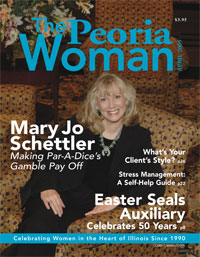 balance and grounded in our values. I also think it’s important that my children see that I love my work and that I’m doing something that makes a difference—just as I learned that from my parents.”
balance and grounded in our values. I also think it’s important that my children see that I love my work and that I’m doing something that makes a difference—just as I learned that from my parents.”
MAY 2005—Barbara Henderson, Devonshire Group
“Learn as much as possible because knowledge is power. No one can take knowledge away from you. Volunteer for any training, workshop, conference, etc. You’ll always learn at least one thing. Relationships are so important…People do things for people…Also, as part of this, find a mentor…A mentor can help you set and monitor goals.”
AUGUST 2006—Cynthia Fischer, Peoria Public School District 150
“Future changes in the classroom will be influenced by the globalization referred to in Thomas Friedman’s book, The World is Flat. We’re no longer preparing our students for local or national competition, but rather competition with students throughout the world who currently are outscoring us nationally in the areas of math, science and technology. This factor alone will force changes to our educational model. Secondly, we’re gaining more information on understanding how the brain really works in relationship to learning. It’s my prediction that both of these factors will have a tremendous influence on classroom instruction, with some changes already beginning to emerge.”
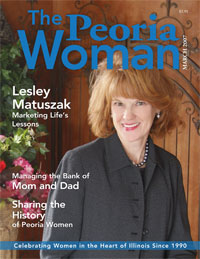 SEPTEMBER 2006—Mary Bell, Caterpillar Inc.
SEPTEMBER 2006—Mary Bell, Caterpillar Inc.
“Be yourself. Male or female, you have unique talents and a unique style. Know what these are and be comfortable enough with yourself to use them. A company doesn’t want or need a group of people who think and act exactly alike. We need diversity of thought, experiences and people to challenge conventional wisdom and innovate.”
MARCH 2007—Lesley Matuszak, Boys & Girls Clubs of Greater Peoria
“I think it’s wise to apply principles from the business world to the educational world, like competition, accountability and merit pay. Teachers do deserve more and should be receiving more, but, along with that, comes raising educational standards and improving assessments.”
SEPTEMBER 2007—Lynnette Demanes, Ravina on the Lakes/Scrapadoodle
“Peoria has been a wonderful place to grow up, establish a career and raise our three daughters. Family has always been what is most important to me, and I feel blessed to be able to be as close to my extended family as I have been…Working full-time and raising my family, I have found it difficult to volunteer as much as I would like, and I’m looking forward to future opportunities.” TPW


